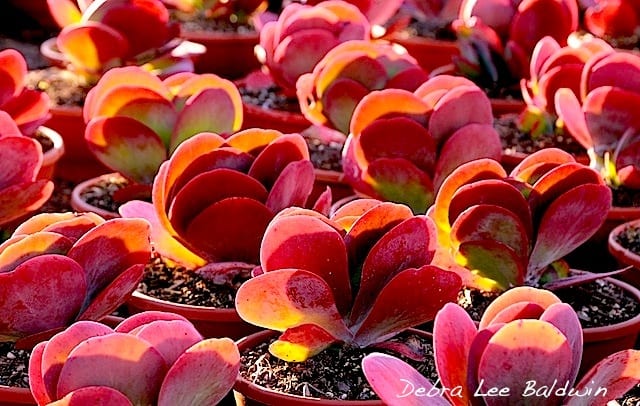
Should You Let Your Flapjack Plants Bloom?
Should you let your flapjack plants (Kalanchoe luciae) bloom? I'm recommending no...but it's not that cut-and-dried.
Flapjack plant is a succulent that's popular mainly because of the color of its leaves. (Shown above at Waterwise Botanicals nursery.)f
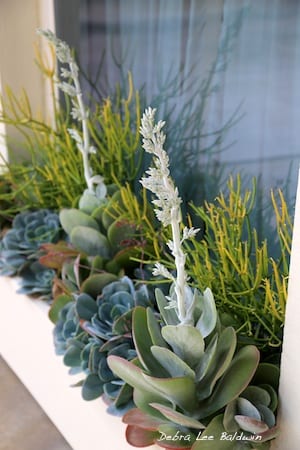
Like other succulents with overlapping leaves along a single stem, when Kalanchoe luciae blooms, the entire plant elongates. This is how those in my window box looked in March of last year.
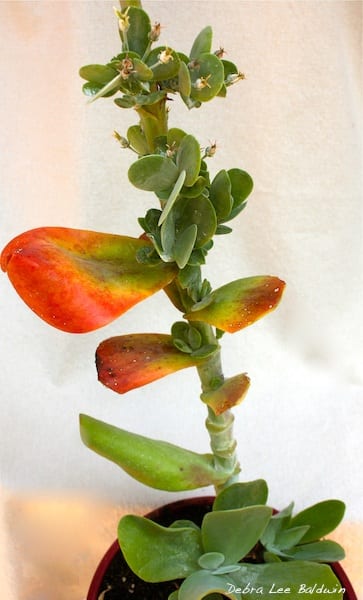
If your goal is to have a lot of new little plants, one option is to let the mother plant bloom. Providing it survives the effort (they usually do, but not always), you've hit the jackpot. Harvest each cluster with several inches of stem attached to anchor it, and start it as a cutting. Roots will grow from leaf axils (where leaves are attached to the stem).
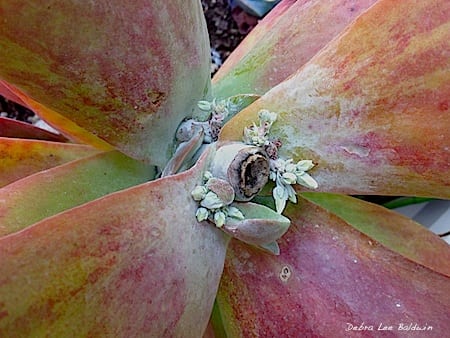
I didn't want awkwardly tall plants in my window box, so when the flapjacks started to elongate in March, I snipped off the bloom spikes. The mother plants seemed determined to flower regardless, and buds grew from leaf axils beneath the cut. I was just as determined they weren't going to flower, so I pinched out the buds.
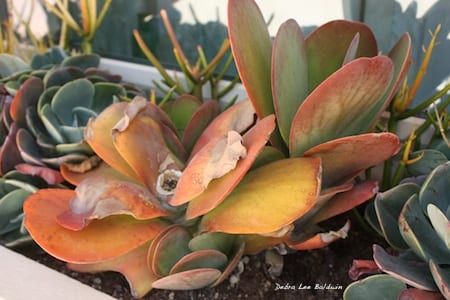
Within a month, the plants' topmost leaves turned beige and crisp along the edges. I'm not sure why this happened, but I trimmed them to keep the plants tidy.
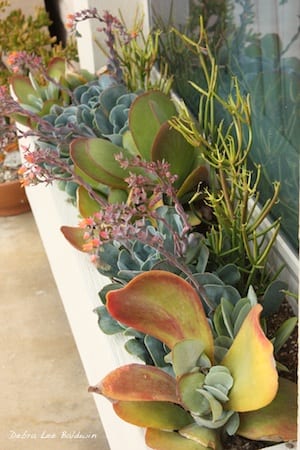
By June, new little leaves concealed the truncated stems, indicating that the plants had been gearing up to produce offsets. When they couldn't do it along a bloom spike, they did so closer to the core.
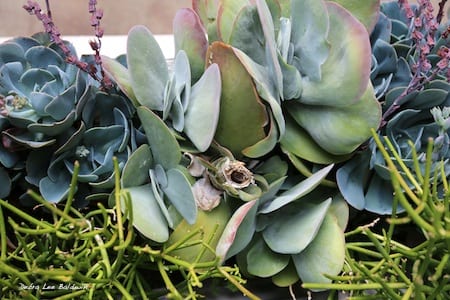
Here's how one of the plants looked in August.
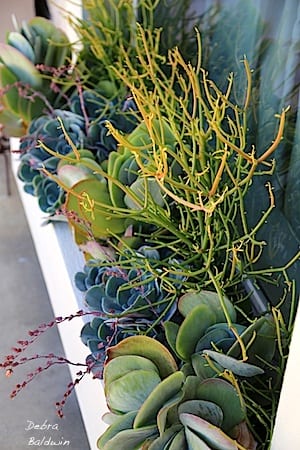
And again in October. Other plants in the window box are blue echeverias and Euphorbia tirucalli 'Sticks on Fire'.
Update: I wrote the above post two years ago. This is how the same windowbox looks now. It has been wonderfully low-maintenance. The aeoniums have grown more, I've pruned the 'Sticks on Fire', and I switched out the echeverias. But all I've done with the Kalanchoe luciae is to remove dry leaves and any new flower stalks...which I'm about to do right now.
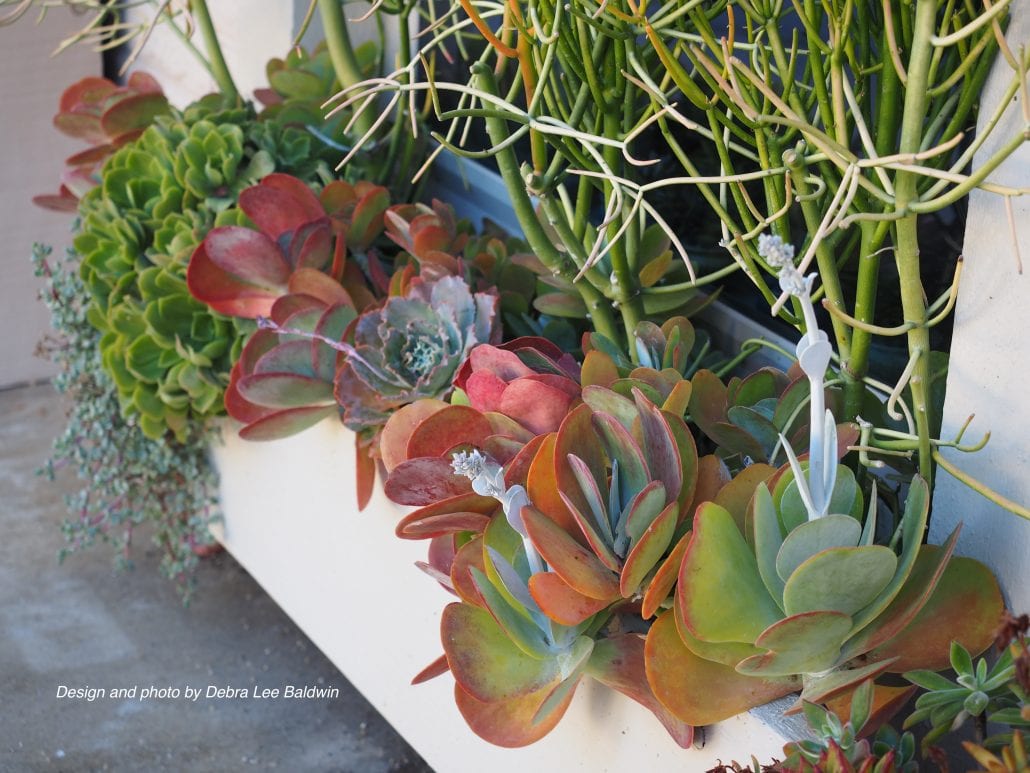
Related Info on This Site: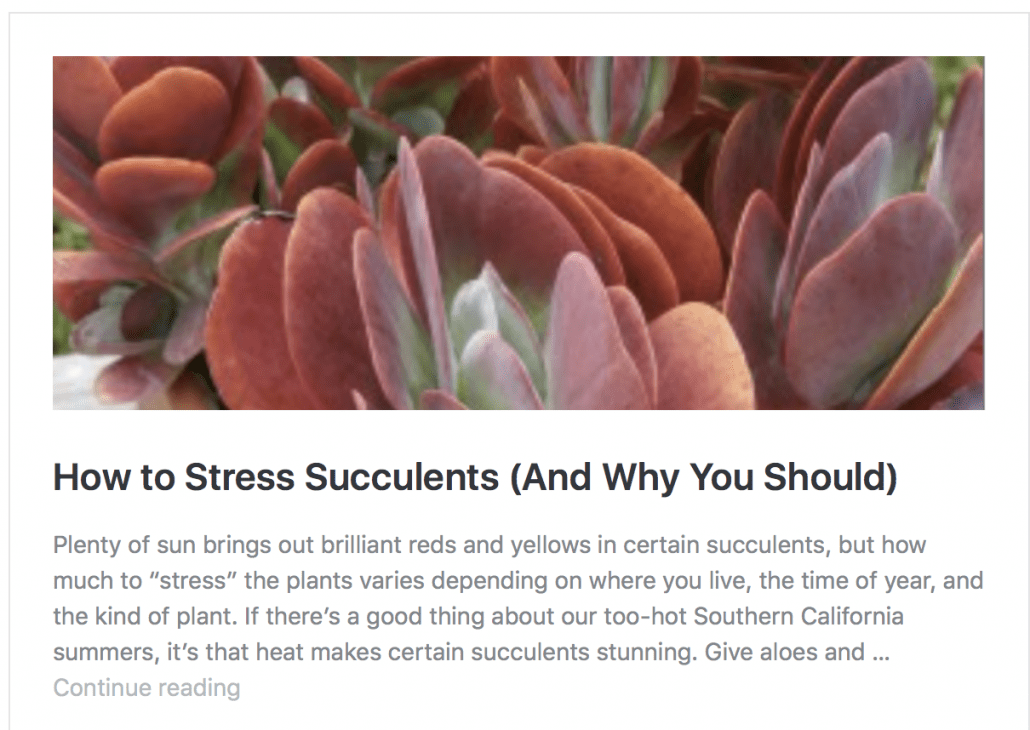
Kalanchoe Details, Photos and Varieties
Kalanchoe: Details, Photos and Varieties Native to Madagascar, kalanchoes thrive outdoors in zone 9 (and higher if in dappled shade). Protect from frost. See All Succulent Types Aeonium Agaves Aloes Cactus Crassula Echeveria Euphorbias Ice Plants Kalanchoe Portulacaria Senecio >> Jump Down to the Gallery All the kalanchoes in the video are also in the…

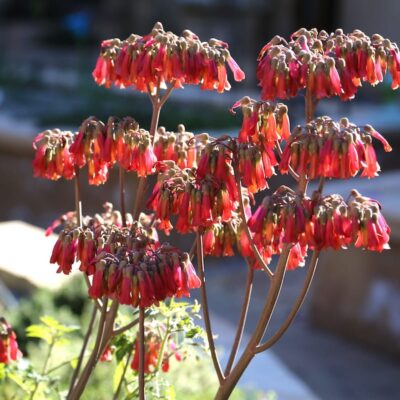
Can you send John Matthews website please. Thanks so much
Catlee
I find that the flapjacks stay red when they have generous amounts of light but very little watering. I have dozens across multiple areas at a job site anf those that are in the shade more than half the day and/or get too much water turn green and produce A LOT MORE of the powdery white stem cover.
Thanks, Emily, good to know!
Hello,
I purchased a flapjack plant two weeks ago, it’ very healthy and green. I placed it on my porch where it gets plenty of sun.
How and when will it turn red like the picture above
Thank You Linda
It will likely turn red gradually. If you don’t notice that the edges are reddening, it may be a variety that doesn’t.
I have a number of young fapjack plants and I think the secret to them turning very red is to starve them for water, and let them be in a sunny but cold position. Good luck !
Hi Debra, Just read your post on Kalanchoe ‘Flapjack’ — I live in SoCal (plenty of sun and dry air). When our Flapjacks started to bloom, I cut the stem off, and now the baby plants are forming in clusters around the outer base.
Just out of curiosity, if you leave the Mother plant intact at flowering & let the ‘babies’ remain in place….what happens? Do they fall off and start growing? Just wondering….thanks for the info about how to remove the main stem with plantlets and root them. Great website, thank you!
Hi Cynthia — The plantlets will continue to drain the main plant which may keel over, thereby putting its offspring on the ground, where they can root.
I have a Flap Jack that has sent out a large chute. It has a flower stem. What should I do with this? I live in Florida and it has been very dry. Thank you.
Hi Ina, You can enjoy the bloom but risk losing the plant, or sever the spike close to the plant and hope it recovers. Up to you.
After blooming you will see lots of baby plants where the blooms were
Yes, but not always. Have you tried starting those baby plants? I’ve tried to cut the stem apart and use it as an anchor for the offsets, letting the bottom of each rest on soil, but they didn’t take. When I cut off the flower spike, the plant produces lots of babies around its base.
How do we get the Flapjack leaves red as shown in the first picture?
I read somewhere that the paddle plant is monocarpic like agaves and dies after flowering. Not a problem as they produce plenty of offsets to take the place of the old stalk. I have one flowering qt the moment. Not very exciting but my husband walked by the other day and said ‘You do grow some amazing plants” I like that.
Hi Jenny — They’re not monocarpic in the strict sense of the word, which is to say they don’t die after flowering. What happens, though, if you don’t cut them back, is that so much energy goes into the bloom stalk that the plant exhausts itself.
Hi Debra.
I wish I would have known this information awhile ago, but am glad to know it now! I’ve misinformed a couple of people on their Kalanchoe Lucias, but will never do it again! Thank you for sharing.
Glad I could help! Thanks, Mary.
I have a very large flap jack, paddle plant, that i bought when it was tiny. It now has a stem coming out of it that is about 6 ft tall. Its in a pot on my front porch, when its too cold, i move it indoors. If i had known it was going to die after blooming, i would have cut this off right away but i do not like altering the “natural” cycle of my plants. Thank you so much for your informative site as i had no idea what this plant was, much less what it was doing! She is beautiful, and feels pleasant to the touch which is why i chose her.
You’ve raised an important point, Teresa. Some plants can be enjoyed and admired even though they don’t last. After all, that’s why we plant “annuals.”
I was told the more sun they get the redder they will be. I had mine on the main Ann’s it was green ,I put it in the sun and it is a beautiful burgandy
more sun
My pet plant is Flapjack. He was in the shade and green. I moved him into the sun and almost overnight he turned red/burgandy.
I want to see how large he will grow so will cut off anything that sprouts out of him. Thanks for info on blooms.
I recently purchased a beautiful flapjack its leaves are large that is what attracted me to it. To keep the leaves large I need to cut the middle bloom as soon as I see it coming up? Do I continue to cut it everytime
Yes, when it starts to bloom, pinch out the buds.
Why do you want your plant to NOT bloom???
Sorry if I was unclear…blooming takes a lot of energy from a succulent, especially a large flower spike that elongates the entire plant. You can preserve your plants by cutting off flower spikes when they begin to form.
I have to say, I love to see the different flowers from unusual plants. Im currently enjoying my flap jack flowers. Prior its flowering phase, I had several multipliers from the roots. I seperate and grow so its not too much of a hassle to lose a plant here or there.
They do look marvelous in bloom. Enjoy them! You may even get baby plants in leaf axils.
Can I cut the stalk off and propagate the stalk I pieces or how is that done? Then bottom of my plant has lots of babies shooting out. Than main plant has a huge (I cut it off today) stalk.
You can try using stem pieces as cuttings. Insert in potting soil so the leaf junctions (axils) are at soil level. Just know they may not root. That may have to do with the size of the cutting (the larger, the more to subsist on while forming roots), the season or time of year, or numerous other factors. I’d love to have a nurseryman weigh in on this!
In this case, should I cut the flower stalk to Kalanchoe ‘Fantastic’ – Variegated Paddle Plant?
Yes, I would.
Hi Debra,
Recently my friend and myself did an install for a client and we put a paddle plant in 2 of her pots with of course many other succulents. When we were planting the flapjacks we noticed a white powder on the stem. I know some succulents have this naturally but we were concerned the plant had some kind of issue. I read a comment from another post that too much water causes this. It came straight from the nursery. Just curious if this is a concern. Thanks for all your fabulous knowledge.
Kim
Hi Kim — It’s perfectly normal. It’s a protection against sunburn. The powder is called pulverulence and is common on other species too.
Hi Debra,
Last fall I took in my succulents which I then placed under grow lights for 12 hours per day. (I live in Canada.) I had a few of my large Echeveria succulents develop a powder on their leaves which spread to the rest of the plant and killed it. I decreased watering when I took them in and tried to get rid of the powder, but to no success. Any suggestions for this year?
Hi Angela — My best guess is that it was mildew caused by dampness, which is really hard to combat. If it’s any consolation, Florida echeveria fanciers have the same problem. It depends on what lengths you’re willing to go, to keep the plants through the winter. Perhaps spray them with a fungicide and keep a dehumidifier going, in addition to a fan for air circulation and grow lights. Or…as a wise nurserywoman advised regarding a plant she wanted to give me and which I feared I would kill, “Well then, my dear, enjoy it for now and consider it an annual.”
I have a good size Kalanchoe Flapjack (about a foot and half tall and mostly green). No sign of blooming yet.
What I’m concerned about it that its in a pot and there are several medium size babies growing beneath it and some are about half the size of the mother plant. I’m concerned about over crowding and id like to take some of the big babies and remove them to replant and grow a new one….But when I tried to remove one it just broke of at the stalk and came up with no roots.
Should I even remove the babies at all?? and If yes how do I do so without hurting them?
Hi Sandra — I had a similar situation with mine and rather than dividing the plant to keep it compact, I trimmed it and planted the cuttings. That made it branch from the cut end. You might plant Mom in the ground and start cuttings in the pot. You also can plant the broken offset like a cutting, although the best time to do that is in spring. It might not take off as well in the heat of summer. Keep it out of full sun, in bright shade.